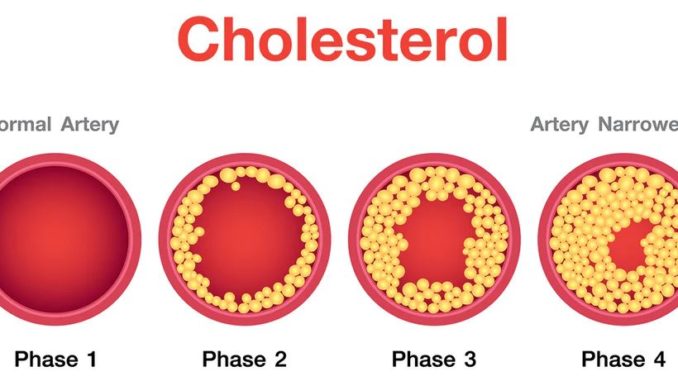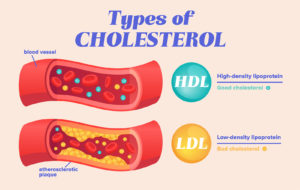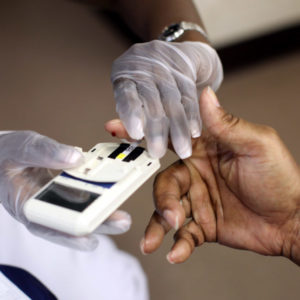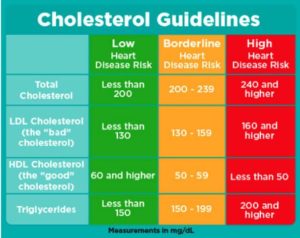
Table of Contents
What is Cholesterol?
- Cholesterol is a type of lipid that our body needs for good health, but in the right amount.
- Cholesterol is a waxy fat like substance that our liver produces naturally.
- Cholesterol is a waxy substance found in our blood.
- Cholesterol is a member of the sterol family and has a complex molecular structure.
- Our body needs cholesterol to build healthy cells, but high levels of cholesterol can increase the risk of heart disease.
- It is a fatty substance (lipid) that is necessary for a healthy life and is a component of cell membranes and intracellular organelle membrane.
- It is amphipathic in nature because it has both a fat-soluble region and a water-soluble portion (a polar -OH group) (a non-polar steroid ring structure and hydrocarbon tail)
Key Facts about Cholesterol
- About 38% of American adults have high cholesterol (total blood cholesterol ≥ 200 mg/dL)
- According to Center for Disease Control and Prevention (CDC), nearly 94 million U.S. adults ages 20 or older have borderline high cholesterol.
- Globally, a third of ischaemic heart disease is attributable to high cholesterol.
- Overall, raised cholesterol is estimated to cause 2.6 million deaths (4.5% of total) and 29.7 million DALYS, or 2% of total DALYS.
- Raised total cholesterol is a major cause of disease burden in both the developed and developing world as a risk factor for ischemic heart disease and stroke.
- High cholesterol has no signs and symptoms. The only way to identify it is getting checked.
- Cholesterol doesn’t dissolve in water, so it can’t travel through blood on its own. So, in order to help transport cholesterol, our liver produces lipoproteins.
- There are two major forms of lipoprotein. They are: low-density lipoprotein (LDL) and high-density lipoprotein (HDL)
Note: Lipoproteins are particles made from fat and protein. They carry cholesterol and triglycerides, another type of lipid, through your bloodstream.
Types of Cholesterol
There are two major types/forms of cholesterol:

1. LDL (Low-density lipoprotein) cholesterol
- LDL cholesterol is any cholesterol carried by low-density lipoproteins.
- If the blood contains too much LDL cholesterol, a person will be diagnosed with high cholesterol.
- LDL cholesterol is commonly known as ‘bad cholesterol’. It transports cholesterol particles throughout the body.
- High level of LDL cholesterol can build up ‘cholesterol plaque’ on the wall of the arteries.
- As a result, plaque will narrow or completely block the arteries, limit the blood flow and raise the risk of blood clots.
- This can ultimately lead to heart attack or stroke.
- Therefore, risk of coronary artery disease and other heart problems rises when your blood LDL cholesterol level is too high.
2. HDL (High-density lipoprotein) cholesterol
- HDL cholesterol is any cholesterol carried by high-density lipoproteins.
- HDL cholesterol is commonly known as ‘good cholesterol’ because it is good for the body and heart.
- HDL cholesterol picks up excess cholesterol and takes it back to the liver i.e., it helps to return LDL cholesterol to the liver so that it (LDL cholesterol) could be removed from the body.
- High level of HDL cholesterol will lower the risk of blood clot, heart disease and stroke.
Importance of Cholesterol
The liver and the majority of cells in the body both create cholesterol. Little ‘couriers’ known as lipoproteins transport it throughout the blood. Cholesterol is important as body uses it to:
- Build the structure of cell membranes
- Produce hormones like estrogen, testosterone, and adrenal hormones that aid in the proper functioning of metabolism.
- For instance, cholesterol is necessary for your body to produce vitamin D and bile acids that aid in the digestion of fat and the absorption of vital nutrients.
Factors Affecting Cholesterol Level
1. Unhealthy lifestyle habits
- Poor diet: Saturated fats raise “bad” LDL cholesterol levels when consumed in large quantities.
- Sedentary lifestyle
- Insufficient/lack of exercise
- Stress
- Alcohol abuse
- Smoking
- Obesity
2. Age
- Adults between the ages of 40 and 59 are typically diagnosed with elevated cholesterol.
- However, in some cases, even young children might experience the effects of unhealthy cholesterol levels.
3. Sex
- Men are more likely than women to have high total cholesterol between the ages of 20 and 39.
- After menopause, a woman is at increased risk.
4. Medicines
- You may see an increase in “bad” LDL cholesterol or a decrease in “good” HDL cholesterol if you take certain medications for other health issues like:
- Cancer
- High blood pressure
- HIV/AIDS
- Acne
- Irregular heart rhythms
- Organ transplants
5. Additional Medical issues
- The disease itself and the medication used to treat it may cause harmful cholesterol levels in patients.
- Medical conditions that can cause unhealthy cholesterol levels are:
6. Family history
- Family history of high cholesterol
Tests to Measure Cholesterol Level
- The quantity of cholesterol and triglycerides in your blood can be determined by a full cholesterol test, also known as a lipid panel or lipid profile.
- To find out if your cholesterol is high and to assess your risk of heart attacks, various types of heart disease, and blood vessel problems, a full cholesterol test is performed.
- Four types of blood fats are measured as part of a full cholesterol test, including:
- Total cholesterol
- High density lipoprotein cholesterol
- Low density lipoprotein cholesterol
- Triglycerides

Levels and Interpretation of Cholesterol

According to the National Library of Medicine, optimal to high categories of LDL (“bad”) cholesterol levels are:

Complications of High Cholesterol
High cholesterol levels can cause plaque in the walls of the arteries. This plaque will narrow the arteries and lead to a condition known as atherosclerosis.
Atherosclerosis can result in:
- Stroke
- Heart attack
- Angina, or chest pain
- Chronic kidney disease
- High blood pressure
- Peripheral vascular disease
Furthermore, high cholesterol can also raise the risk of gallstones.
Dietary Habits to Reduce Cholesterol Levels
Foods that help to reduce high cholesterol levels are:
- Different kinds of nuts, particularly, almonds, walnuts, peanuts etc.- for lowering the cholesterol.
- Low salted varieties
- Fibrous and Vitamin E rich foods.
- Olive oil- as it contains monosaturated fats
- Tofu, soya milk, soya nuts, yoghurts etc- helps liver to take out the ‘bad’ LDL cholesterol
- Oats: it contains a compound called beta glucans which form a thick gel in the GI track and binds cholesterol in the gut so that body cannot absorb the cholesterol
- Variety of fresh fruits, vegetables
- Wholegrain foods
- White meat products: fish or chicken
Now let us discuss more about ‘High Cholesterol’ and ‘Low Cholesterol’
High Cholesterol
1. Symptoms of High Cholesterol Level
- Basically, high cholesterol level does not have any symptoms. The majority of the time, it only results in emergencies. Therefore, it is crucial to have regular checkup.
- A heart attack or stroke, for example, can come from the damage caused by high cholesterol.
2. Causes of High Cholesterol
- Eating too much saturated fat
- Not exercising enough
- Gaining too much body fat, particularly in the midsection.
- Smoking can raise your cholesterol levels, and the tar it creates in your arteries makes it simpler for cholesterol to adhere to the walls of your arteries.
You cannot control the following factors that raise cholesterol:
- Ageing or sex
- A form of elevated cholesterol that is inherited called as familial hypercholesterolemia (FH).
- Kidney or liver disease
- An underactive thyroid gland
3. Preventive measures
- Two strategies to lower chances of acquiring high cholesterol include:
- Eating healthy foods and
- Exercise
- Consume a diet low in salt with a focus on fruits, vegetables, and healthy grains.
- Use healthy fats sparingly and animal fats in moderation.
- Get rid of extra weight and keep your weight in check
- Stop smoking
- Engage in at least 30 minutes of exercise most days of the week.
- If you do consume alcohol, do so in moderation.
- Reduce stress
4. Treatment
- The primary class of medication used to lower cholesterol is statins.
- If you need to take any additional medications to help regulate your cholesterol levels, your doctor will let you know.
Low Cholesterol
1. Low cholesterol symptoms
- Low cholesterol levels don’t usually have clear-cut signs and symptoms.
- There is no chest pain associated with low cholesterol, indicating a buildup of fatty substances in an artery.
- Despite the rarity of the concerns, having very low levels of LDL cholesterol may increase your risk of:
- Cancer
- bleeding stroke
- Depression and Anxiety
- If your cholesterol is low when you are pregnant, it could result in preterm birth and low birth weight.
2. Causes
- A family history of low cholesterol, the use of statins or other blood pressure medications, and untreated clinical depression are all contributing factors of low cholesterol
3. Preventive measures
It’s quite uncommon for people to take action to prevent having a level of cholesterol that is too low because most people don’t bother about it. However, following steps can be adopted to keep the cholesterol level balanced:
- Get routine checks to maintain a healthy level of cholesterol.
- To avoid taking statins or blood pressure drugs, maintain a heart-healthy diet and an active lifestyle.
- Know whether there is a family history of high cholesterol
- Finally, be aware of any signs of stress and anxiety, especially if any make you feel aggressive.
4. Treatment
- Most likely, your diet or physical health is to cause for your low cholesterol. It’s crucial to realize that treating low cholesterol doesn’t just involve consuming foods that are high in the cholesterol.
- It may be possible to address your low cholesterol by making recommendations for your food and lifestyle after collecting blood samples and completing a mental health assessment.
- Antidepressant might be given if mental health is being negatively impacted by cholesterol level or the other way around.
- Additionally, it’s likely that taking statins has made cholesterol too low. Prescription dose or medication may need to be modified if that is the case.
References and For More Information
https://www.betterhealth.vic.gov.au/health/conditionsandtreatments/cholesterol
https://www.cdc.gov/cholesterol/facts.htm
https://www.who.int/data/gho/indicator-metadata-registry/imr-details/3236
https://my.clevelandclinic.org/health/articles/11920-cholesterol-numbers-what-do-they-mean
https://www.cdc.gov/cholesterol/ldl_hdl.htm
https://www.nhs.uk/conditions/high-cholesterol/
https://www.nhlbi.nih.gov/health/blood-cholesterol/causes
https://www.bhf.org.uk/informationsupport/risk-factors/high-cholesterol
https://www.healthline.com/health/cholesterol-can-it-be-too-low#treatment
https://www.cdc.gov/cholesterol/index.htm
https://www.healthline.com/health/high-cholesterol#complications
https://www.nhlbi.nih.gov/health/blood-cholesterol
https://www.heart.org/en/health-topics/cholesterol
Very informative and useful article. Many Thanks.